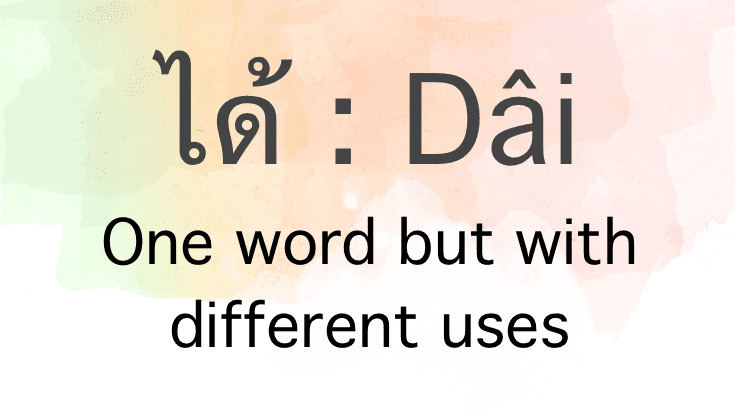One word but with different uses
Some Thai words can have different functions and can have many meanings depending where it’s added in a sentence and the context; the circumstances that form the setting for an event, statement, or idea, and in terms of which it can be fully understood and assessed.
The word ได้ : Dâi is one of them. To understand these types of words, you must understand the sense of the word. The sense of the word ได้ : Dâi is ‘to obtain/acquire’
Usage 1
1. [verb] to obtain, to acquire, to get (got), have got [used to indicate the action of obtaining/acquiring something]
Sentence structure: Subject + ได้ : Dâi (to obtain/acquire) + something
Examples;
You went for a job interview and when you are back, your wife asks you ‘คุณได้งานไหม : Koon Dâi Ngaan Măi? = you + obtain/acquire/get + job + ? = Did/Do you get a job?’
Then you can either answer her ‘ได้ : Dâi = obtain/acquire/get’ or ‘ไม่ได้ : Mâi Dâi = not + obtain/acquire/get’
You went on a fishing trip and when you are back, your wife asks you ‘คุณได้ปลากี่ตัว : Koon Dâi Bplaa Gèe? Dtua = You + obtain/acquire/get + fish + how many? + unit word for animal = How many fish did/do you get?
Then you answer her ‘ได้ปลา 3 ตัว : Dâi Bplaa Săam Dtua = obtain/acquire + fish + 3 + unit = I get/got 3 fish.
The verb ได้ : Dâi is often used with another noun (something) as a compound word as the sense of the action involving obtaining something e.g. ได้ที่ : Dâi~Têe = (obtain/acquire~place) = be fitting, be just right. When this occurs you need to think of it as a compound word not two separate words.
Usage 2
[past / past perfect tense word] did, have + v3Sentence structure: Subject + ได้ : Dâi (past / past perfect) + action verb + explanation
Examples;
You went for a job interview and when you get back, your wife asks you
คุณได้ไปสัมภาษณ์งานไหม : Koon Dâi Bpai Sŭm-pâad Ngaan Măi? = you + did/have + go + interview + job + ? = Did you go to the job interview? (Sense: The subject obtained/acquired the action of going for a job interview)
Then you can either answer her ได้ไป : Dâi Bpai = did/have + go’ or ‘ไม่ได้ไป : Mâi Dâi Bpai = not + did/have + go
You went on a fishing trip and when you are back, your wife asks you
คุณได้ไปตกปลาไหม : Koon Dâi Bpai Dtò’k~Bplaa Măi? = you + did/have + go + fishing + ? = Did you go fishing? (Sense: The subject obtained/acquired the action of going for fishing)
Then you can either answer her ‘ได้ไป : Dâi Bpai = did/have + go’ or ‘ไม่ได้ไป : Mâi Dâi Bpai = not + did/have + go’
If the past tense word ได้ : Dâi is used with future tense word จะ : Jà (will) as จะได้ : Jà~Dâi + verb, this can be interpreted in different ways depending on the context
a) indicating the future which will be or have happened/occurred/happening
b) indicating the future which will be obtaining an action/event
Examples;
ผมจะได้ไปตกปลาพรุ่งนี้ : Pŏ’m Jà~Dâi Bpai Dtò’k~Bplaa Prôong~Née = I will be going fishing tomorrow. (Sense: The subject will be obtaining the action going for fishing tomorrow)
ผมจะได้ไปสัมภาษณ์งานวันจันทร์ : Pŏ’m Jà~Dâi Bpai Sŭm-pâad Ngaan Wun~Jun = I will be going for a job interview on Monday. / I will have been to a job interview on Monday. (Sense: The subject will be obtaining the action of going for an interview on Monday)
ผมจะได้รู้ผลวันอังคาร : Pŏ’m Jà~Dâi Rúu Pŏ’n Wun~Ung-kaan = I will know the result on Tuesday. (Sense: The subject will be obtaining the knowledge about the result on Tuesday)
The tense word ได้ : Dâi is often used with a verb as a compound word as the sense of the action involving past/past perfect tense e.g. ได้ยิน : Dâi~Yin = (did/have~hear) = to hear. When this occurs you need to think of it as a compound word not two separate words.
Usage 3
[ability/possibility modifier] be able to, be possible to, can/couldSentence structure: Subject + verb + (explanation) + ได้ : Dâi (able to, possible to, can/could)
Examples;
ผมทำได้ : Pŏ’m Tum Dâi = I + to do/make/create + can = I can do (it). (Sense: I obtain/acquire the ability to do it)
ผมพูดภาษาไทยได้ : Pŏ’m Pûud Paa-săa Thai Dâi = I + to speak + language + Thai + can = I can speak Thai (language). (Sense: The subject have obtained/acquired the ability to speak Thai)
ผมเรียนภาษาไทยพรุ่งนี้ได้ : Pŏ’m Rean Paa-săa Thai Prôong~Née Dâi = I + to study/learn + language + Thai + tomorrow + can = I can study Thai language tomorrow. / I can have a Thai lesson tomorrow (Sense: The subject have obtained/acquired the possibility to study Thai or have a Thai lesson tomorrow)
It’s quite sophisticated so you just need to understand how to use it and get used to it by thinking like a Thai.
โชคดีค่ะ : Chôk~Dee Kâ = Good luck. 🙂



